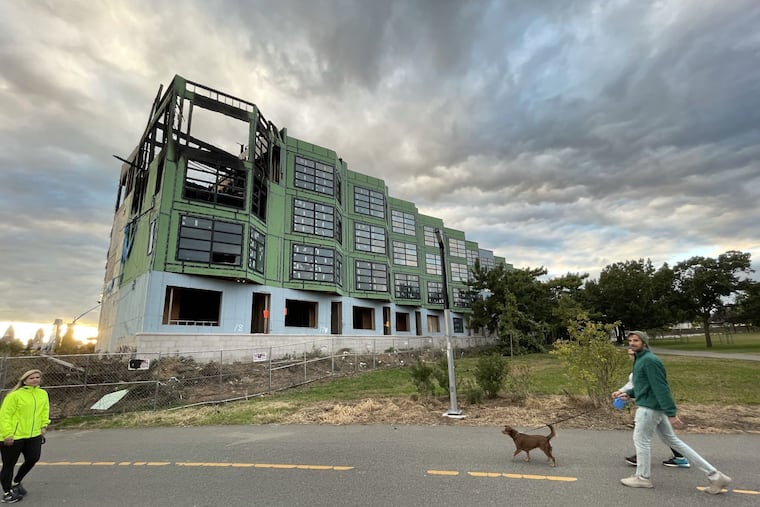Blighted luxury houses facing Fishtown’s Penn Treaty Park will be demolished. Now what? | Inga Saffron
How a Delaware waterfront townhouse project managed to fail in Philadelphia’s sizzling housing market remains a mystery to the city’s development community and Fishtown residents alike.

There was always something unusual about the plan to erect a single row of high-end townhouses on the sliver of land between Fishtown’s Penn Treaty Park and the Rivers Casino parking lot. Unlike most developments in Philadelphia, the houses did not front onto a public street, and instead treated the park’s sloping lawn and waterfront vista as their own private preserve. Maybe that’s why the project’s developers could boast back in 2019 that they had received advance offers of $1.5 million for several houses.
Today, the only occupants of this Delaware waterfront development are squatters. The 18 homes sit half-built, their green insulation material flapping in the wind. Construction stopped even before the pandemic began, and the building permits are now expired. The two houses closest to the Delaware waterfront trail were blackened in a fire that lit up the Fishtown skyline just before dawn Oct. 8.
That fire was the final straw for Philadelphia’s Department of Licenses & Inspections. On Tuesday, the agency selected a contractor to demolish all 18 houses, in what may be the city’s first instance of luxury blight removal. Karen Guss, a department spokesperson, said the firm will begin taking down the structures in the next several days. The bill will go to the developer, New York’s Gotham Bedrock, although the company has declared Chapter 11 bankruptcy and is fighting with its lender, Sharestates, in court.
Guss said the city had declared the site unsafe immediately after the fire and asked Sharestates, a real estate finance company based in Great Neck, N.Y., to submit a plan for securing the houses. When Sharestates failed to act, L&I decided the city’s only option was to raze the luxury development itself. Most likely, the upper floors will be removed and the concrete foundations left in place.
How a waterfront project managed to fail in Philadelphia’s sizzling housing market remains a mystery to the city’s development community and Fishtown residents alike. “This should have been a slam dunk,” observed Greg Hill, a developer who is building 500 houses a bit farther north on the river, at Cumberland Street. “They did all the hard work of pouring the foundations and getting the project out of the ground. Why stop there?”
The project had already received all the necessary city approvals for construction when Gotham bought the 1.5-acre site from Shovel Ready Projects, a Philadelphia developer, in 2017 for $7 million. The deal even included an architectural design by Abitaire Design Studio. While Gotham suffered a brief delay after the U.S. Army Corps of Engineers found that it had failed to obtain a riverbank stabilization permit, the matter was quickly resolved, according to Kevin Maley, the corps’ chief of enforcement for the region.
Gotham, which boasted of its success with several Brooklyn projects, nevertheless got off to a slow start. The foundations for the houses, which had to be reinforced with steel because of the marshy ground, were not completed until 2019. Gotham fired its first contractor, and then at least two more, according to a source who was involved with the project. Work stopped altogether in early 2020 and the company declared bankruptcy this summer. “This was an issue of self-destruction,” the source said. Abitaire’s Stephen Mattei complained that Gotham still owes him $250,000 for design work.
Although the city’s decision to demolish the houses will remove the blight that has marred the popular waterfront park, it leaves open the question of what will happen next. Several Philadelphia developers, including Hill, have expressed interest in acquiring the narrow site. It is believed that Gotham also owns a separate parcel just south of the houses, bordering the casino parking lot.
But Gotham’s unfinished development shows how problematic the site is for private homes. While many similar parks around the city are bordered by rowhouses, those homes are typically delineated from the public realm by a city street. Gotham’s houses appear to be standing in Penn Treaty Park and their presence blurs the lines between public and private space.
“These homes just don’t belong there,” said David Perri, who recently retired as the commissioner of L&I. He suggested that it was a mistake to zone the site for housing.
The arrangement also appears to violate the spirit of the Central Delaware Master Plan, which called for major improvements at Penn Treaty Park. Last year, the Delaware River Waterfront Corp. completed the first major upgrade, an extension of its recreation trail through the park. A long, curving seating area overlooking the water, and offering spectacular views of the Ben Franklin Bridge, has become a popular community gathering spot. The bench is just a few feet from Gotham’s houses.
Through the work of local volunteers, the park has become a lush oasis. Jonathan Doran, an architect who helps run the park’s friends group, said members recently secured a $65,000 state grant to buy new trees and shrubs. Since working with the friends group, Doran has become increasingly concerned about the effects of climate change on the park. He noted that the Delaware River shoreline originally stopped at Beach Street, which means that almost all of Penn Treaty Park is built on landfill. “I really wonder about who’s deciding what can be built on the waterfront,” he said.
Once the city completes the demolition of Gotham’s houses, it seems likely that Gotham’s bankruptcy proceedings will keep anything new from being built on the site for several years. By then, the risks of building on this fragile and special waterfront location should become a lot more clear.